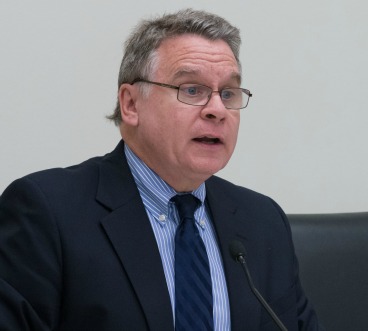Mr. Speaker, yesterday I chaired a hearing of the Helsinki Commission that examined the Russian government’s repeated violations of its international security, economic, and human rights commitments.
In accord with the three dimensions of security promoted by the OSCE and the Helsinki Final Act of 1975, the Commission looked at Russia’s respect for the rule of law through the lens of three ‘‘case studies’’ current to U.S.-Russian relations—arms control agreements; the Yukos litigation; and instances of abduction, unjust imprisonment, and abuse of prisoners.
Forty years after the signing of the Helsinki Final Act, we face a set of challenges with Russia, a founding member of the organization, that mirror the concerns that gave rise to the Helsinki Final Act.
At stake is the hard-won trust between members—now eroded to the point that armed conflict rages in the OSCE region. The question is open whether the principles continue to bind the Russian government with other states in a common understanding of what the rule of law entails.
In respect of military security, under the 1994 Budapest Memorandum Russia reaffirmed its commitment to respect Ukraine’s independence, sovereignty, and existing borders. Russia also committed to refrain from the threat or use of force or economic coercion against Ukraine. There was a quid pro quo here: Russia did this in return for transferring Soviet-made nuclear weapons on Ukrainian soil to Russia.
Russia’s annexation of Crimea and subsequent intervention in the Donbas region not only clearly violate this commitment, but also every guiding principle of the 1975 Helsinki Final Act. It appears these are not isolated instances. In recent years, Russia appears to have violated, undermined, disregarded, or even disavowed fundamental and binding arms control commitments such as the Vienna Document and binding international agreements, including the Conventional Forces in Europe (CFE), Intermediate Nuclear Forces (INF), and Open Skies treaties.
In respect of commercial issues, the ongoing claims regarding the Russian government’s expropriation of the Yukos Oil Company are major tests facing the Russian government. In July 2014, GML Limited and other shareholders were part of a $52 billion arbitration claim awarded by the Hague Permanent Court of Arbitration and the European Court of Human Rights (ECHR).
In response, the Russian government is threatening to withdraw from the ECHR and seize U.S. assets should American courts freeze Russian holdings on behalf of European claimants, while filing technical challenges that will occupy the courts for years to come. All of this fundamentally calls into question Russia’s OSCE commitment to develop free, competitive markets that respect international dispute arbitration mechanisms such as that of the Hague.
I note that U.S. Yukos shareholders are not covered by the Hague ruling for their estimated $6 billion in losses. This is due to the fact that the United States has not ratified the Energy Charter Treaty, under which European claimants won their case, as well as the continued absence of a bilateral investment treaty with Russia. This has handicapped U.S. investors in Russia’s energy sector, leaving them solely dependent of a State Department espousal process with the Russian government.
We were all relieved to learn that Mr. Kara-Murza is recovering from the attempt on his life—by poisoning—in Russia earlier this year. His tireless work on behalf of democracy in Russia, and his personal integrity and his love of his native country is an inspiration—it is true patriotism, a virtue sadly lacking among nationalistic demagogues.
Sadly, the attempt on Mr. Kara-Murza’s life is not an isolated instance. Others have been murdered—most recently Boris Nemtsov—and both his and Mr. Kara-Murza’s cases remain unsolved.
In other cases, such as the abductions, unjust imprisonments, and abuses of Nadiya Savchenko, Oleg Sentsov, and Eston Kohver, we are dealing the plain and public actions of the Russian government. Nadiya Savchenko, a Ukrainian pilot and elected parliamentarian, was abducted by Russian government agents, imprisoned, subjected to a humiliating show trial, and now faces 25 years in prison for allegedly murdering Russian reporters—who in fact were killed after she was in Russian custody. Meanwhile, a Russian court has sentenced Ukrainian film director Oleg Sentsov on charges of terrorism. Tortured during detention, Sentsov’s only transgressions appear to be his refusal to recognize Russia’s annexation of the peninsula and his effort to help deliver food to Ukrainian soldiers trapped on their Crimean bases by invading Russian soldiers. And the kidnaping and subsequent espionage trial against Estonian law enforcement officer Eston Kohver demonstrates the Russia’s readiness to abuse its laws and judicial system to limit individual freedoms both within and beyond its borders.
The Magnitsky Act that I had the honor to co-sponsor was in part meant to address human rights abuses such as these. It sanctions those involved in the abuse, and works to discourage further human rights violations while protecting those brave enough to call attention to their occurrence. It troubles me greatly to hear that the Administration’s listings of sanctioned individuals has thus far only targeted ‘minor players,’ rather than those who pull the strings.








